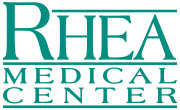
This information is designed to help you understand the process of care delivered in the emergency department. We hope it will clarify some commonly asked questions, and that you will experience a smooth emergency visit.
Step 1: Your Arrival
If you have been driven to the emergency department and require a wheelchair or assistance into the Department, your driver should enter the department and request assistance from a member of the staff. Your driver should park in the main hospital parking lot and you should enter through the common front entrance to the hospital. To your right will be the Emergency Room.
f you arrived by ambulance, your emergency care may begin with Step 3 or may begin with you being brought immediately to a treatment room.
Step 2: Signing In
You will need to register by being signed in at the registration desk in the emergency department waiting area. The registration clerk will ask you for your name, birthday, social security number, and the reason for your visit. The registration clerk will then ask you to be seated, and a triage (assessment) nurse will be notified of your arrival.
Step 3: Triage
Triage is the place where your health concern is initially evaluated. The nurse will assess the best course for your emergency treatment and provide basic first aide, if needed. He/she may also direct you to the radiology department for x-rays, if appropriate.
The triage personnel will initiate your record, obtain consent for your treatment and ask you if you have advance directives such as a living will. Based on the severity of your illness, the triage nurse may elect to send you directly to a treatment room. Remember, often the severity of one’s illness is not noticeable to the eye. It is based on clinical and scientific data.
If the nurse chooses to triage you in the triage area, he/she will ask you questions regarding the reason for your visit to the emergency department for treatment. There will also be questions about your health concerns, such as how and where the injury occurred or how long your medical condition as been going on. There will be questions concerning medication administration, treatment assistance, condition monitoring, comfort/pain, previous surgeries, past medical history, and family history.
You will be given information about patient’s rights & responsibilities at triage after signing the consent to treatment form.
Step 4: The Exam Room
The triage nurse will either direct you to a treatment room for immediate care or will direct you to the waiting room until a treatment room becomes available. After the doctor has done a medical screening exam, the registration clerk will come to the bedside to obtain insurance and payment information. You will be asked for your insurance cards and to pay a co-pay.
You will be asked not to eat or drink anything until the physician can see you. Before using the restroom, be sure to ask the nurse if a urine specimen may be required for your treatment. The nurse will also keep your family members informed of your progress and will let them know when they may visit.
While you are undergoing treatment, we ask that you leave your valuables with the family member, partner, or the individual who accompanied you to the emergency department.
An emergency physician or licensed practitioner will examine you at the earliest opportunity. Additional questions may be asked and tests, such as laboratory, EKG, or x-ray exams, may be ordered. The physician may need to consult with your primary care physician to coordinate treatment, or call a specialist regarding your condition.
Your nurse will check on you periodically. You will be given a “call light” to use if you need to request nursing assistance.
Step 5: Your Discharge
A large percentage of our patients are able to return home after treatment. If you are discharged to go home the emergency department staff will give you instructions for follow-up care, including the name of a doctor to call for additional treatment. We will ask you to sign a discharge summary, which states that you understand your instructions.
If you need to be admitted to the hospital, the registration staff will assist you and your family members with these arrangements. Appropriate beds for admitted patients are not always immediately available. You may need to spend additional time in a patient care area within the emergency department designed for this purpose. The nursing staff will try to make your stay in the department as comfortable as possible.
Insurance and Billing
Because insurance policies, providers, and coverages vary, the staff cannot answer questions regarding your specific insurance. You will need to contact your insurance company directly to obtain answers to your questions.
If you have an emergency room copay, you will be asked to pay during your visit. Rhea Medical Center accepts cash, checks and most major credit cards.
If you are unable to pay for your services, you may contact Rhea Medical Center’s patient account representative at 423-775-8563 to see if you qualify for any financial assistance or to establish payment arrangements.
Emergency Room physicians and radiologists are independent contractors. Services that they provide (the physician that you see while you are in the ER, and interpretation of imaging exams) are billed separately from hospital charges. The insurance information that you provide to the hospital will be forwarded to all other providers involved in your care.
If you have any questions regarding hospital services on your statement, you can contact the business office at (423) 775-8593. Business office hours are 8 a.m. until 4 p.m., Monday through Friday.
Advance Directives
This information on advance directives has been provided by the State of Tennessee. It is the policy of Rhea Medical Center to honor patients’ advance directives to the extent permitted by law. The following information on DNR (do not resuscitate) is made available to patients in the emergency department and on each hospital nursing unit:
“Planning in Advance for Your Medical Treatment”
“Your Right to Decide About Treatment”
Adults in Tennessee have the right to accept or refuse medical treatment, including life-sustaining treatment. Our constitution and state laws protect this right. This means that you have the right to request or consent to treatment, to refuse treatment before it has started, and to have treatment stopped once it has begun.
Planning in Advance
Sometimes, because of illness or injury, people are unable to talk to a doctor and decide about treatment for themselves. You may want to plan in advance to make sure that your wishes about treatment will be followed if you become unable to decide for yourself for a short or long time period. If you don’t plan ahead, family members may not be able to make decisions for you and follow your wishes.
In Tennessee, appointing someone you can trust to decide about treatment if you become unable to decide for yourself is the best way to protect your treatment wishes and interests. You have the right to appoint someone by filling out a form called a Health Care Proxy. A copy of the form and information about the Health Care Proxy are available at your facility.
If you have no one you can appoint to decide for you, or do not want to appoint someone, you can also give specific instructions about treatment in advance. These instructions can be written, and are often referred to as a living will.
You should understand that general instructions about refusing treatment, even if written down, might not be effective. Your instructions must clearly cover the treatment decisions that must be made. For example, if you just write down that you do not want “heroic measures,” the instructions may not be specific enough. You should say the kind of treatment that you do not want, such as a respirator or chemotherapy, and describe the medical condition when you would refuse the treatment, such as when you are terminally ill or permanently unconscious with no hope of recovering. You can also give instructions orally by discussing your treatment wishes with your doctor, family members, or others close to you.
Putting things in writing is safer than simply speaking with people, but neither method is as effective as appointing someone to decide for you. It is often hard for people to know in advance what will happen to them or what their medical needs will be in the future. If you choose someone to make decisions for you, that person can talk to your doctor and made decisions that they believe you would have wanted or that are best for you, when needed. If you appoint someone and also leave instructions about treatment in a Living Will, in the space proved on the Health Care Proxy form itself, or in some other manner, the person you select can use these instructions as guidance to make the right decision for you.
Deciding About Cardiopulmonary Resuscitation
Your right to decide about treatment also includes the right to decide about cardiopulmonary resuscitation (CPR). CPR is emergency treatment to restart the heart and lungs when a person’s heart stops beating or he or she stops breathing. Sometimes doctors and patients decide in advance that CPR should not be provided and the doctor gives the medical staff a Do Not Resuscitate order (DNR order). If your physical or mental condition prevents you from deciding about CPR, someone you appoint, your family members, or others close to you may decide.
Telephone
There is a telephone located in the emergency department lobby. To make a local call, dial, �9′ to get an outside line and then the telephone number. To make a long distance call, you will have to go through the operator and use a calling card or credit card.
If you, as a patient in the emergency department, need to call a family member, the emergency department registration staff will provide you a portable handset that can be brought to your room for your use.
Cellular Phones and Two Way Radios
Cellular phones and two-way radios may interfere with patient monitoring and other sensitive equipment. Therefore, the use of these items is prohibited within the medical center.
Translation Services
For patients who are unable to communicate in English, translation services can be provided in any language. Please contact your nurse if translation is needed. Some languages less common to Rhea County may be accessed by your nurse through the AT&T Language Line.
